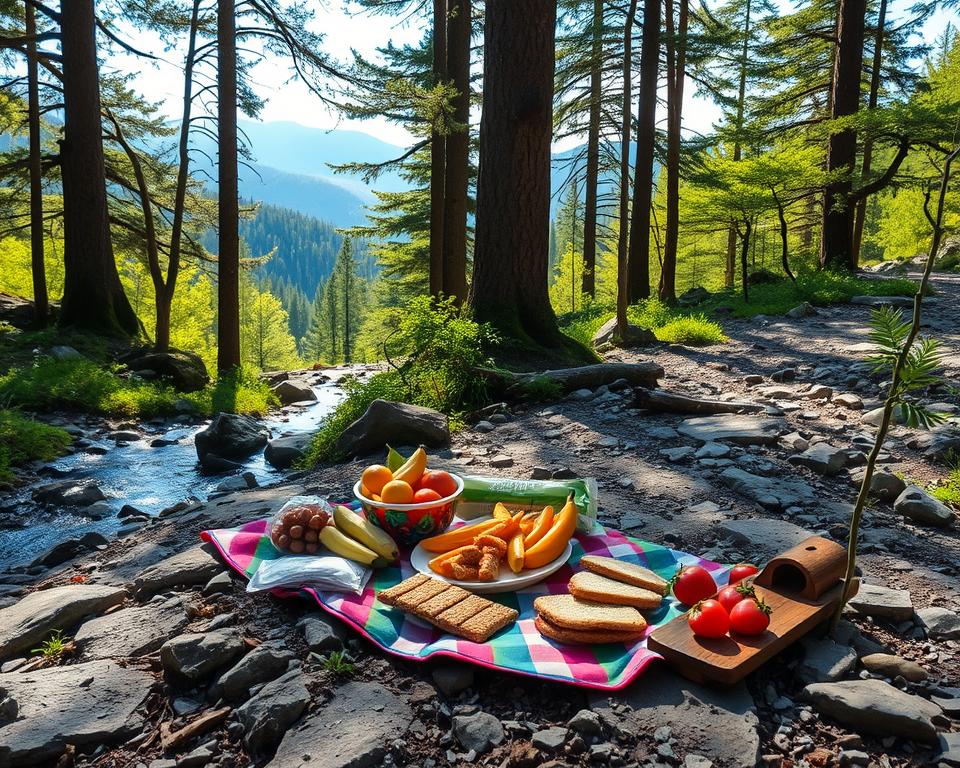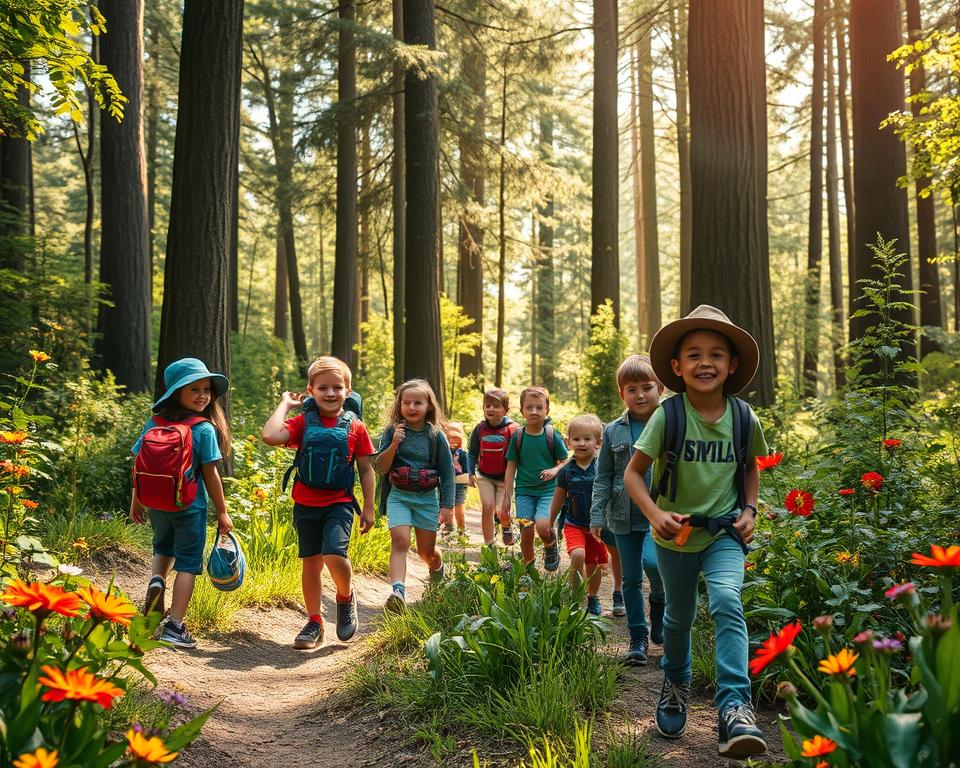Getting your kids ready for their first hike is thrilling yet a bit challenging. The trick is to ensure the hike is fun and doable. Picking a trail that’s easy yet full of cool spots like lakes or streams is key. Let your kids lead the way. Make sure there’s lots of time for them to explore.
Choosing the right equipment for your kids is crucial. Take the 10 Essentials and add kid-friendly stuff like wet wipes and binoculars. Snacks are important; fill a big part of your pack with tasty, healthy options like dried fruit bars. And, always have plenty of water to keep everyone happy and hydrated. I find water bottles better than bladders because they’re simpler to clean.
Wearing the right clothes is key for a good hike. Dressing in layers works best, and don’t forget warm hats and gloves for any season. Extra socks can stop blisters and keep feet dry. It’s smart to carry an additional outfit and a jacket for each kid, just in case the weather changes.
Never overlook safety. Always carry a charged phone, IDs, and watch the battery life on longer trails. Use paper maps or downloadable apps if there’s no cell service. Choosing the right gear matters too; I like the Osprey Daylite Plus and REI Traverse 32 backpacks for family trips. A smaller pack helps avoid overpacking. Teaching Leave No Trace principles early on will help kids learn to cherish and care for nature.
Benefits of Hiking with Kids
Hiking is more than just a walk in the woods. It boosts kids’ personal growth and strengthens families. Parents who see hiking as easy and fun are more likely to do it with their children. This leads to many happy moments together.
Building Confidence and Independence
Family hikes boost children’s confidence and independence. On hikes, kids learn to explore, handle new situations, and tackle challenges. Even babies join in, carried in wraps or backpacks.
Older kids can lead the way on age-appropriate trails. Hiking lets kids test their limits and grow strong, both physically and mentally. They learn about nature, animals, and the world, expanding their minds.
Quality Family Time
Trails offer great family time, away from screens and busy lives. Early morning hikes are best, as kids are full of energy and the weather is cooler. Letting kids lead makes hikes fun for everyone. We stop to play and explore.
This adventure nurtures a love for the outdoors and teaches kids to care for our planet. It turns into valuable lessons and unforgettable memories.
Instilling an Appreciation for Nature
Hiking connects kids with nature, teaching them to value and protect it. They discover plants, animals, and the importance of conservation. Their curiosity blossoms as they learn.
Just 90 minutes in nature cuts down negative thoughts, helping mental well-being. Hiking combines learning with fun, covering subjects like math and science. It encourages habits of care and resilience from a young age.
How to Prepare Your Kids for a Hike
Getting your kids ready for a hike can be fun with the right approach. It’s about enjoying the journey together. Choosing kid-friendly trails, packing necessary items, and having the right gear makes it special.
Choosing the Right Trail
Look for trails that are easy and not too long. Choose paths that lead to cool places like waterfalls. This keeps kids excited and eager to explore more.
Packing the Essentials
Packing smart is key for a great hike. Here’s what you should bring for your kids:
- Wet wipes
- Lip balm
- Binoculars
- Safety whistles
- Snacks and water
- First aid kit
- Bug spray
- Sunscreen
- Extra clothing
- Map and compass
These items keep them comfortable and safe. Remember, taking short breaks helps them stay happy and energetic.
Dressing Appropriately
It’s important to dress your kids in proper hiking clothes. Use layers like hats and gloves, and don’t forget rain gear. Choose sturdy shoes from brands like Vasque or Roarsome. Also, heavy pants are great for extra protection. Layering allows for adjusting to the weather easily.
With good preparation, your children’s hiking experience can be safe, fun, and unforgettable. Enjoy your adventure!
Tips for a Successful Hiking Experience
Starting a hike with kids means being ready to change plans as needed. It’s important to let them make some decisions, take breaks often, and keep things fun. Here are some useful tips to make your hike enjoyable for everyone.
Setting the Right Pace
Letting the kids lead is a great way to make hiking fun. It makes them feel in charge and helps avoid frustration. Since every child moves at their own speed, adjust your pace to fit their energy. This lets them explore more and take needed breaks.
Making Frequent Energy Stops
Snack breaks are key to a happy hike. Pack their favorite snacks and water, and use break time as a reward. These pauses let everyone rest and take in the nature around them. They’re not just for refueling; they’re a chance to enjoy the journey.

Keeping Kids Engaged
To keep hiking interesting for kids, be creative. You can play scavenger hunts to spark their excitement. Use apps like Seek for an educational twist, identifying plants and animals. Geocaching turns hiking into a fun treasure hunt. Giving kids tasks like picking stops keeps them engaged and feeling valued.
Leave No Trace Principles
Teaching kids the Leave No Trace principles is key to making them future protectors of nature. These principles stress the need to plan ahead for safety. They teach us to pack food in a way that reduces trash. And they remind us to keep groups small to follow rules and goals.
Following these rules means groups won’t have to set up camp too late, protecting the environment. The Center for Outdoor Ethics updates the 7 Leave No Trace principles to keep up with environmental changes. One principle includes creating catholes for waste. They should be 6 to 8 inches deep and far from water, camps, and trails. This keeps the wilderness clean.
It’s important to keep fires small and only use small sticks. Watching wildlife from afar and not feeding them helps keep them safe and acting naturally. We should also respect old structures and items by looking, not touching. This is what Leave No Trace stands for.
The Leave No Trace program teaches millions how to care for nature each year. It helps us teach kids how important it is to reduce our impact. This way, we leave nature untouched for others to enjoy.
- Plan ahead and prepare
- Travel and camp on durable surfaces
- Dispose of waste properly
- Leave what you find
- Minimize campfire impact
- Respect wildlife
- Be considerate of other visitors
What Should I Consider When Preparing Kids for Their First Hiking Adventure with Toddlers?
When preparing kids for their first hiking adventure with toddlers, focus on safety, packing essentials, and setting realistic expectations. Implement effective hiking strategies for exploring with toddlers, such as choosing short, engaging trails and incorporating fun breaks. Keeping the experience enjoyable will foster a love for nature in young ones.
Conclusion
Thinking back on family hikes shows us how much they add to our lives. Hiking helps kids and adults grow and appreciate nature. Our adventures on different trails have brought us closer as a family. They have created lasting memories that go beyond just hiking.
Preparing well for a hike with kids is key. It’s important to drink plenty of water, about two cups every hour for each person. Bring snacks like trail mix and apple slices to keep the energy up. Playing games like I Spy and doing breathing exercises can make hiking fun for everyone.
It’s our duty to care for nature while enjoying it. Teaching kids to leave no trace helps protect these places for future visits. Hiking combines exercise, bonding, and caring for the environment. It’s a great family activity. I urge families to start their own nature adventures. It’s a way to build strong connections and make memories that last.

